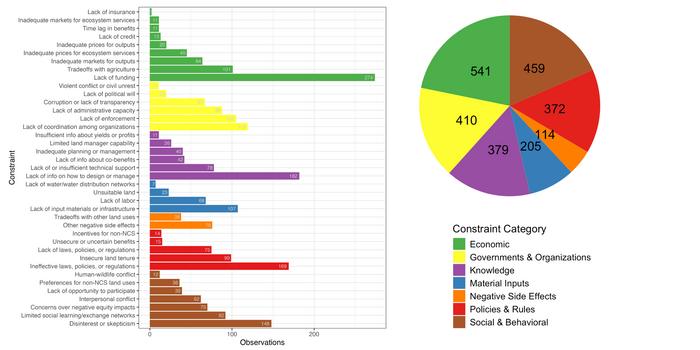In recent years, the concept of natural climate solutions has emerged at the forefront of global climate mitigation strategies. These solutions encompass conservation, restoration, and ecosystem management practices designed to either reduce greenhouse gas emissions or enhance carbon sequestration. Estimates suggest that natural climate solutions could contribute to over one-third of the emissions reductions necessary to limit global warming to below 2°C by 2030. Despite this tremendous potential, the widespread implementation of such solutions remains hindered by a complex web of social, political, informational, and economic barriers.
A groundbreaking study recently published in PNAS Nexus undertakes the first comprehensive global analysis of these constraints, meticulously mapping the roadblocks that impede natural climate solution deployment across countries. Drawing on an extensive review of 352 peer-reviewed studies, the researchers dissect the multifaceted challenges that differ both in nature and intensity depending on the type of solution and the socio-political context in which it is applied. Their approach highlights the heterogeneity of constraints faced worldwide and offers critical insights for policy makers, conservationists, and stakeholders.
The analysis reveals that funding shortages are the most pervasive barrier to implementing natural climate solutions. Limited financial resources impede project initiation, scaling, and sustainability, especially in low-income regions that might benefit most from such interventions. However, financial constraints do not operate in isolation. Informational deficits about ecosystem management, coupled with ineffective policies and governance structures, create a compounded effect that stymies progress in many countries.
Interestingly, the nature of barriers varies across different ecological strategies. For instance, the protection and restoration of wetland ecosystems—an activity that promises significant carbon sequestration benefits—are most often restricted not by lack of funding but by insufficient knowledge. Wetlands are ecologically complex and require nuanced, location-specific management plans that are frequently underdeveloped or poorly understood by practitioners and policy makers alike.
Reforestation, another cornerstone of natural climate solutions, faces unique social constraints that can compromise its effectiveness. In many regions inhabited by subsistence farmers, expanding forest cover can lead to reduced availability of farmland, thereby threatening local livelihoods and food security. Concerns over these adverse equity impacts often fuel resistance against reforestation initiatives, making social acceptance and equitable benefit-sharing essential components for success.
Conversely, efforts to protect existing forests are often undermined by a lack of enforcement capacity. Legal frameworks may exist on paper, but the failure to monitor and prevent illegal logging or land conversion diminishes conservation gains. This enforcement gap highlights the urgent necessity for strengthening institutional frameworks as part of integrated climate strategies.
The study also underscores the intricate interplay between different types of barriers. Economic constraints, political will, social acceptability, and informational clarity interact in ways that are highly context-dependent. Therefore, a one-size-fits-all approach to promoting natural climate solutions is unlikely to succeed. Instead, tailored interventions that recognize and address these multifaceted obstacles in tandem are essential.
Given the diverse and pervasive nature of these constraints, the authors conclude that unlocking the full climate mitigation potential of natural climate solutions will require systemic collaboration across sectors and disciplines. Scientists, governments, local communities, NGOs, and private sectors must align their efforts to develop context-specific, integrated strategies that can surmount present challenges and foster scalable, long-term solutions.
Moreover, the comprehensive maps provided by this research offer a valuable tool for improving estimates of the near-term, feasible climate mitigation achievable through natural solutions. By identifying particular constraints at the country level, stakeholders can prioritize resources and design interventions that are both effective and equitable.
The implications of this research extend beyond climate mitigation. Addressing barriers to natural climate solutions simultaneously benefits biodiversity conservation, ecosystem resilience, and socioeconomic development. Such co-benefits reinforce the urgency and importance of overcoming implementation roadblocks to realize a sustainable, climate-resilient future.
In sum, while natural climate solutions present a promising avenue toward meeting global climate goals, their implementation faces a labyrinth of challenges that vary by context, solution type, and socio-political environment. Understanding and navigating these constraints is paramount. This new global analysis marks a critical step in that direction, providing an essential knowledge base for policymakers and practitioners aiming to harness the power of nature in the climate fight.
As the world grapples with accelerating climate impacts, the need to bridge the gap between natural climate solution potential and action has never been greater. This research underscores that unlocking nature’s full mitigation potential will demand not only financial investment but also enhanced knowledge sharing, policy innovation, enforcement, and social engagement on a global scale.
Ultimately, the path forward lies in recognizing the interconnectedness of ecological, economic, and social factors that define natural climate solutions and fostering partnerships committed to integrated, place-based interventions. By doing so, the global community can move closer to delivering on the promise of a more sustainable and equitable climate future.
Subject of Research: Constraints to the implementation of natural climate solutions for greenhouse gas mitigation at a global scale.
Article Title: Global analysis of constraints to natural climate solution implementation
News Publication Date: 24-Jun-2025
Image Credits: Credit: Brumberg et al.
Keywords: Climate change mitigation




